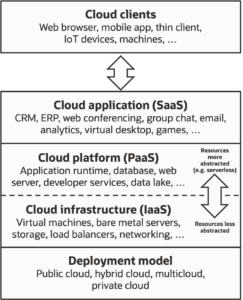Cloud Computing implies the use of a computer that is not located with the user (on premise), but owned by a service provider and located in a computing centre. In most cases it’s not a physical server, but a virtual machine. Cloud Computing is not limited to providing (virtual) hardware, other services are possible, too.
Services
Cloud Computing services are generally split into three levels.

Infrastructure as a Service (IaaS)
IaaS means providing (virtual) hardware on which the customer can run software. This covers not only the computers themselves, but also all network infrastructure. The advantage of virtualization is the flexibility in configuring hardware. Cloud Computing providers offer many different configurations of CPUs, memory, storage etc., making to possible to custom tailor the infrastructure to the desired application.
Platform as a Service (PaaS)
PaaS is the supply of a software platform on which the customer can build his own services. Examples are web servers and database servers. Other than with SaaS, the underlying hardware and operating system is usually not visible to the user/customer due to virtualisation, only the components that are relevant to him. Software is usually deployed in containers, with Kubernetes being the most popular platform for this.
Software as a Service (SaaS)
SaaS goes even further. With SaaS the software for the end user runs in the cloud, and is accessed via a web browser or remote desktop application. Examples are the accounting software Exact Online, and Microsoft 365. The underlying software and hardware layers are invisible to the customer and user, and not their responsibility either.
Providers
There are three big players on the Cloud Computing market:
- Amazon with AWS (Amazon Web Services)
- Microsoft with Azure
- Google with the Google Cloud Platform
All three offer the full spectrum of Cloud Computing: storage, virtual machines, web and database servers, and a large number of specialist services such as AI/machine learning. The prices are comparable. A smaller player is e.g. Strato, who provide storage and web hosting, but also virtual machines and dedicated servers, and thus cover at least the layers IaaS and PaaS.
When to use Cloud Computing?
Cloud Computing is seen by some as the ideal solution for all server needs of an organization. It is important though to be aware of the associated costs.For long-term use, the costs are usually higher than those of an on-premise or co-location (where own hardware is placed in a computing center) solution.
On the other side you get ease of use and flexibility. It is not necessary to maintain and administer own hardware, and the Cloud solution is hosted in a computing centre with fast Internet connection. When more computing power is needed, it is very easy to (temporarily) scale up. All things considered, there are predominantly three scenarios where the use of Cloud Computing makes sense:
- The use of lots of computing power for short periods of time.
- The archiving of data that is most likely not to be used again, but needs to kept e.g. due to legal requirements.
- The use of functionality such as Machine Learning services, and services that need to scalable, with high availability, and possibly accessible world-wide.
What can Hai Performance do for you?
You want to use Cloud Computing, but don’t know where to start? You want advice for choosing the right platform or help with implementing a Cloud solution? Or you want to run computations faster on a virtual machine with many cores, but your software isn’t parallelized yet? I can help you with all these questions. Interested? Then get in touch.
